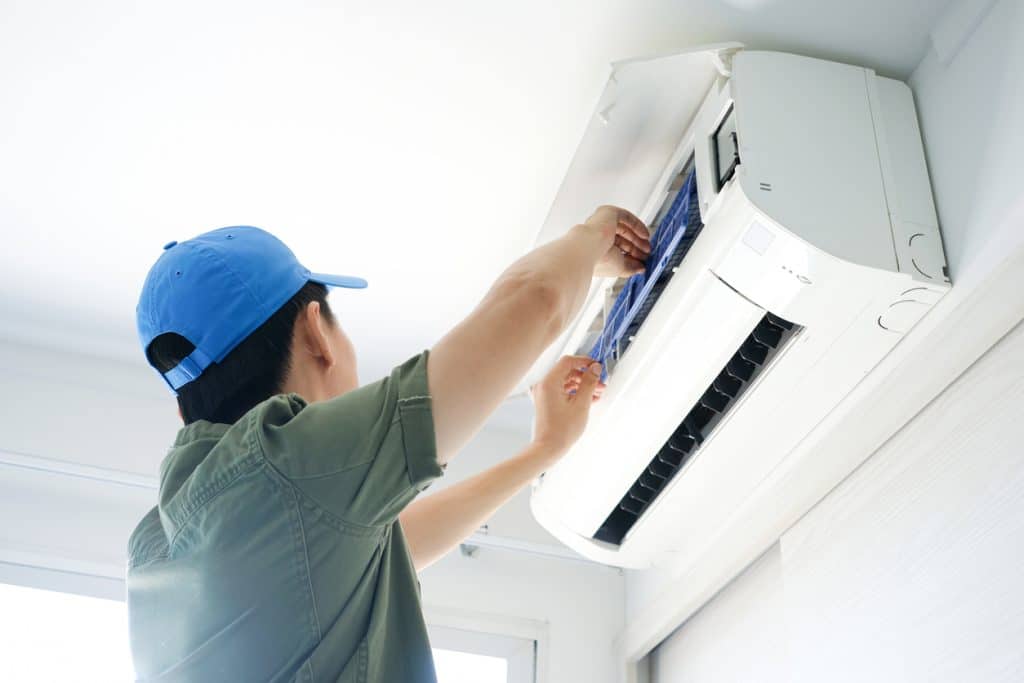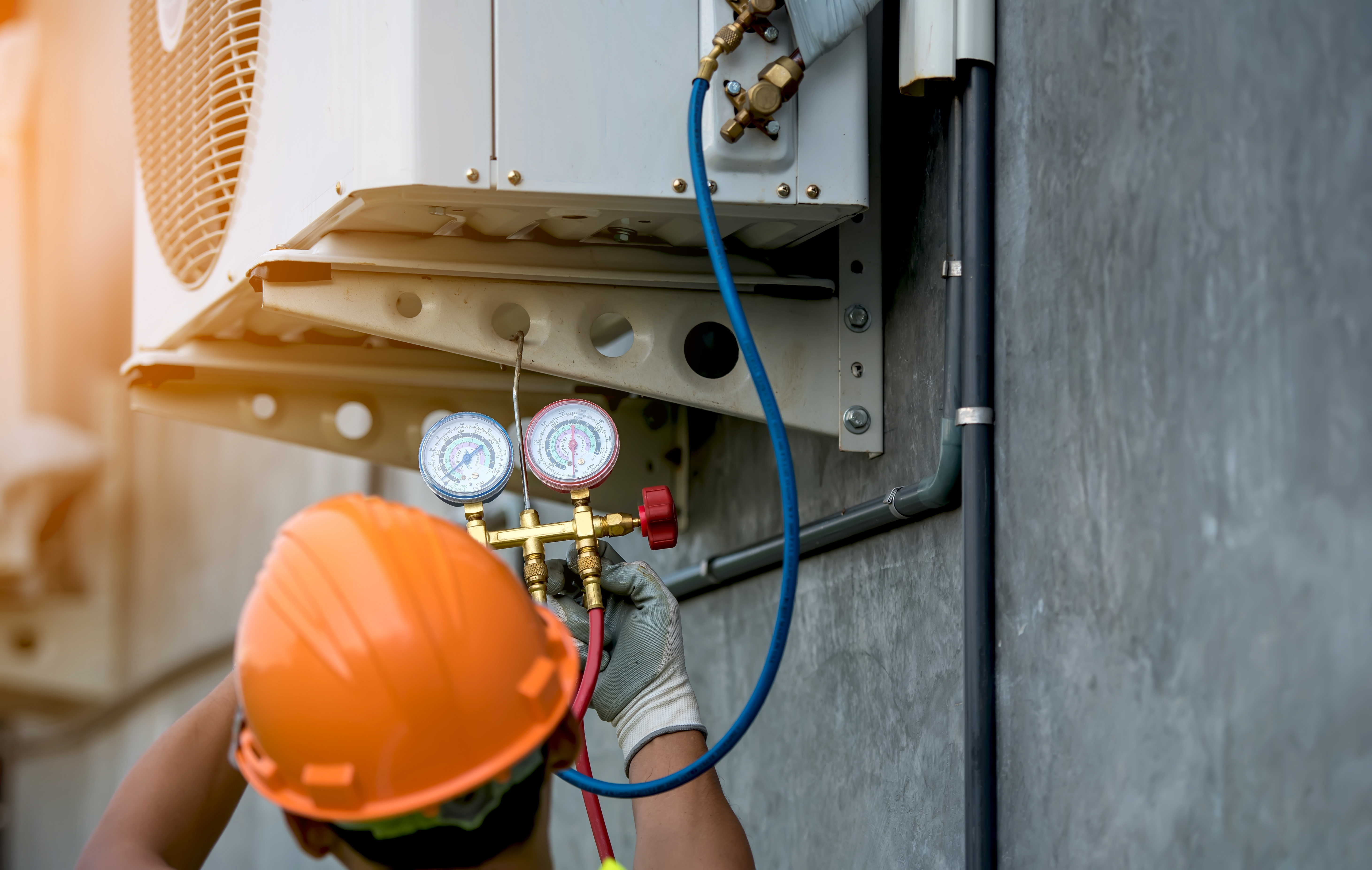Everything about HVAC: Identifying Common Issues and Effective Air Conditioning Fixing Methods
A/c systems are crucial for preserving indoor comfort. Recognizing their components and functionality is vital for determining common issues. Property owners commonly deal with problems such as inadequate air conditioning, odd odors, or rising power costs. These signs can show underlying problems that may call for interest. Exploring do it yourself troubleshooting strategies can be useful, however knowing when to look for expert aid is similarly essential. What actions can be taken to ensure resilient performance?
Recognizing Your Heating And Cooling System: Components and Capability
An a/c system, typically considered the backbone of interior climate control, contains a number of vital parts that collaborate to manage temperature level and air top quality. The primary aspects include the heating unit, air flow system, and cooling system. The heating unit, generally a heating system or central heating boiler, creates heat during chillier months, while the cooling device cools down interior spaces during the summertime.

Typical Cooling And Heating Issues Homeowners Experience
Homeowners usually deal with numerous common HVAC issues, consisting of inconsistent temperature level circulation throughout their living areas. In addition, unusual sounds throughout procedure can indicate underlying issues that need focus. Addressing these worries promptly is vital for keeping optimal system efficiency.
Inconsistent Temperature Level Circulation
Many families experience the irritating issue of inconsistent temperature level circulation, where particular rooms really feel annoyingly cozy while others remain as well cold. This issue commonly arises from a range of factors, consisting of inadequate insulation, obstructed vents, or a poorly sized cooling and heating system. When air ducts are not effectively sealed or when furniture obstructs airflow, some spaces might obtain insufficient air conditioning. In addition, thermostat positioning can considerably influence temperature law; a thermostat located in a sunlit location might misrepresent the overall temperature level of your home. Routine upkeep, consisting of cleansing filters and guaranteeing ductwork is clear, can assist ease these disparities. Home owners might additionally think about zoning systems to better control temperatures throughout different areas of the home, promoting a much more comfortable living environment.
Uncommon Sounds Throughout Procedure
When a HVAC system operates, uncommon noises can indicate underlying issues that require focus. Home owners might come across a variety of noises, such as grinding, squealing, or hissing. Grinding noises frequently signal worn-out bearings or elements, while squealing can recommend loosened belts or components needing lubrication. Hissing may show a cooling agent leak, which can compromise the system's efficiency. In addition, banging noises could direct to loose ductwork or an issue with the blower follower. Each of these noises serves as a caution, prompting property owners to examine further. Overlooking these indications can lead to even more significant troubles and costly fixings. Routine upkeep and timely attention to unusual sounds can improve system long life and performance, ensuring a comfortable living atmosphere.
Indications That Indicate Your Air Conditioner Requirements Repair Work
Just how can one tell if their a/c unit is in demand of repair? A number of indicators may show underlying issues needing specialist attention. Initially, if the AC stops working to cool down the space successfully, it may recommend a cooling agent leakage or compressor breakdown. Additionally, a rise in energy costs without matching usage modifications might signify ineffectiveness in the system. Property owners should additionally be sharp to unusual scents emanating from the device, which might show mold and mildew development or electric problems. Additionally, if the air conditioner frequently cycles on and off, it may be an indication of a faulty thermostat or other mechanical problems. Finally, the existence of water pooling around the system can suggest a blocked drain line. Acknowledging these signs early can conserve time and money, making sure that the a/c system operates successfully and successfully.
Do It Yourself Troubleshooting Techniques for HVAC Issues
When facing a/c problems, home owners can utilize numerous do it yourself fixing techniques to determine the issue. Key techniques include examining thermostat setups, inspecting air filters, and evaluating drain problems. These actions can assist pinpoint usual breakdowns prior to seeking specialist help.
Checking Thermostat Setups
What steps should homeowners require to ensure their thermostat settings are correct? They must verify the thermostat is established to the desired temperature level and mode, whether home heating or cooling. Looking for a clear display and validating the thermostat is not set to "hold" or "vacation" setting is essential. House owners ought to additionally verify that the thermostat is degree and installed in an area without drafts, straight sunshine, or other temperature level affects. In addition, altering the thermostat can assist provide accurate analyses. If the thermostat operates batteries, replacing them might fix any type of concerns. By methodically evaluating these aspects, house owners can usually identify and fix thermostat-related issues, promoting optimal a/c system efficiency.
Inspecting Air Filters
Air filters play a necessary duty in maintaining ideal a/c efficiency. They catch dust, irritants, and various other particles, making certain clean air circulation. Over time, filters can become blocked, lowering air movement and performance. To check air filters, people must initially locate the filter, commonly discovered in the return air duct or near the heater. When located, they must examine the filter's problem-- if it shows up unclean or discolored, it most likely demands substitute. Most filters require changing every 1-3 months, depending upon usage and environmental aspects. Regular examination and prompt substitute of air filters not just improve air high quality check my source however likewise lengthen the lifespan of cooling and heating systems, preventing prospective malfunctions and costly repair services.
Evaluating Drainage Issues
Exactly how can property owners effectively recognize and resolve drainage concerns within their cooling and heating systems? They need to check the condensate drain line for blockages or blockages, which can lead to water buildup. Homeowners may make use of a wet/dry vacuum to get rid of any type of particles obstructing the line. Next off, inspecting the drainpipe pan for corrosion or leakages is important, as a harmed this article pan can create water to overflow. Regular cleansing of the drainpipe line with a blend of vinegar and water helps stop future obstructions. Furthermore, making certain appropriate incline of the drain line promotes effective water flow. If these do it yourself techniques do not solve the problem, seeking advice from a professional HVAC service technician might be required to prevent possible water damage and system failure.
When to Call an Expert for A/c Repairs

While some a/c concerns can be taken care of through DIY methods, there are circumstances where calling an expert ends up being crucial. Homeowners ought to seek professional support when they come across consistent troubles, such as insufficient air conditioning, odd sounds, or unusual odors originating from the system. These signs might show deeper issues that require specialized expertise and tools to detect and repair appropriately.

Preventative Maintenance Tips for Heating And Cooling Durability
Normal preventative upkeep can substantially boost the long life of cooling and heating systems. House owners need to set up yearly examinations by qualified technicians to assess system efficiency and recognize possible concerns. Routinely changing or cleansing air filters is essential, as this guarantees correct air flow and minimizes stress on the system. Furthermore, checking and sealing ductwork prevents energy loss and improves general efficiency.
It is likewise suggested to maintain the outside unit free from debris and vegetation, permitting for peak air movement and warm exchange. Homeowners ought to inspect the condensate drainpipe for obstructions to avoid water damage and mold and mildew development. Preserving appropriate thermostat setups and utilizing programmable alternatives can improve power efficiency. Ultimately, documenting maintenance tasks helps track solution history and can help in identifying persisting issues (air conditioner repair). By complying with these preventative measures, individuals can make the most of the efficiency and life-span of their a/c systems
Frequently Asked Inquiries
How Commonly Should I Change My A/c System Filters?
Heating and cooling system filters must generally be changed each to three months, relying on usage, filter type, and ecological variables. Regular replacement assists maintain effectiveness and air top quality, guaranteeing peak system efficiency throughout the year.
What Size Heating And Cooling System Do I Need for My Home?
To figure out the ideal HVAC system size for a home, one need to take into consideration square footage, insulation quality, and local climate. Consulting a professional can assist ensure maximum More Info effectiveness and convenience for the certain living room.
Exist Eco-Friendly Heating And Cooling Options Available?
Yes, environment-friendly HVAC choices are available, including energy-efficient warmth pumps, solar-powered systems, and geothermal heating. These options minimize energy usage and environmental effect, promoting sustainability while keeping effective environment control for property and business rooms.
How Can I Improve My cooling and heating System's Energy Efficiency?
To boost cooling and heating energy efficiency, one can on a regular basis maintain the system, seal air leakages, install programmable thermostats, make use of energy-efficient filters, and assurance adequate insulation throughout the home to minimize energy usage and enhance efficiency.

What Is the Typical Life Expectancy of a Cooling And Heating System?
The ordinary life-span of a cooling and heating system typically varies from 15 to 25 years, relying on variables such as upkeep, use, and the top quality of installment. Normal maintenance can considerably prolong its operational longevity.
Conclusion
In summary, a detailed understanding of heating and cooling systems equips house owners to identify common problems and address minor problems effectively. Identifying indications of malfunction, employing do it yourself fixing techniques, and focusing on normal maintenance can enhance system performance and performance. When faced with intricate repair work, getting expert aid is essential to assure security and longevity. By promoting awareness and positive care, individuals can enjoy a comfy indoor atmosphere while reducing unanticipated prices linked with heating and cooling failings.